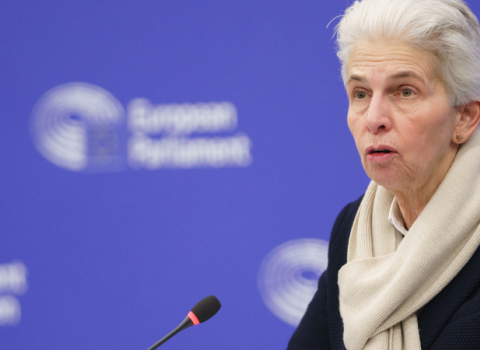Innovation is critical to protect Europe from security threats and to ensure its companies are competitive in the global market. Current funding won’t deliver say MEPs

MEP Riho Terras. Photo: Philippe Stirnweiss / European Parliament
The EU should put more money into defence R&D, to improve its security and make European companies more competitive, MEPs said on 11 November.
In a draft report on critical technologies for security and defence by Parliament’s industry, research and energy committee, ITRE, MEPs stress the importance of defence research in the face of the current geopolitical turmoil. "The most critical pillar for innovation is the availability of adequate funding schemes," the report says.
The European Defence Fund (EDF), the primary EU funding mechanism for defence R&D, saw its budget cut by approximately 40%, from €13 billion to €7.9 billion, in the initial proposal for the 2021-2027 budget.
The decision to make the cut was taken by EU leaders, who wanted to focus on pandemic recovery and did not see defence spending as necessary in peacetime. But that was before Russia invaded Ukraine on 24 February. Defence R&D has now moved up the political agenda and calls for more money have multiplied.
"Europe should increase defence funding, and part of the EDF should go to modern technologies, which would bring advantage on the battlefield,” said centre-right MEP Riho Terras, rapporteur of the document. “We have seen in Ukraine that it is modern technology that wins in modern conflicts, provoking fewer casualties."
In Ukraine, alongside tanks and traditional weapons, several advanced military technologies have been successfully used in combat, such as drones, artificial intelligence, cyber warfare and satellite monitoring of battlefronts and troop movements.
For Terras, increasing EU funding for defence research is also a matter of industry competitiveness. The lack of resources for innovation, "Brings us to a competitive disadvantage in the world defence market," he said.
Currently, only 4 - 8% of EDF funding is devoted to R&D on disruptive technologies. Meanwhile, the US is expected to spend $40 billion on defence technology innovation in 2023, while China increased the share of funding for innovation in its overall $230 billion budget for defence in 2021.
Revision to be proposed
A change in EU funding could come with the Commission's mid-term review of the multiannual financial framework in the second quarter of 2023. The Commission is set on proposing a revision which would increase EU money for defence, EU budget commissioner Johannes Hahn said last month in Brussels.
Adrian Schmitz, communication director at the Aerospace, Defence and Industry Association said the EU budget review, “Should be used to raise the EU's ambition level in defence [by] significantly increasing the EDF budget, to at least the proposed €13 billion."
At the same time, Schmitz said, the budget should also include additional funds for disruptive technologies and fast-track procedures for urgent projects.
In another sign this issue is moving up the agenda, on 17 November the Parliament’s Budget committee on voted a resolution to ensure there is flexibility to allow the 2021 - 2027 multiannual budget to match evolving needs.
ITRE’s report comes as a response to the Commission’s roadmap on critical technologies for security and defence, published in February. It will be debated by ITRE on 5 December, with a final vote on 9 March 2023.
Dual use
The draft document also calls for more dual use of technologies developed for civilian applications. There are multiple hurdles here, including entry barriers, especially for SMEs that are not part of the military-industrial complex and do not get invited to bid for contracts, and other obstacles related to technology and know-how.
Terras said that getting SMEs on board is crucial to translate existing technologies to "implement them in the military field."
The Commission is currently putting in place various measures to promote dual use. One is the (expected) €2 billion EU Defence Innovation Scheme (EUDIS), which among other initiatives will set up dual-use technology incubators, cross-border innovation networks and measures to support innovative companies.
In addition, in 2021, the Commission launched a plan to promote synergies between civil, defence and space industries, in which it aims to encourage a joined up approach to funding across mechanisms including Horizon Europe, the EDF, the EU Space programme, the European Innovation Council, InvestEU and others.
According to Schmitz, the plan is a good effort, but there is room for improvement. "The Commission should go beyond identifying existing opportunities for synergies and adopt a more systematic approach,” Schmitz said, “To achieve this, it should introduce new forms of integrated planning across relevant programmes, as well as mainstream synergies into all EU funding instruments.”





 A unique international forum for public research organisations and companies to connect their external engagement with strategic interests around their R&D system.
A unique international forum for public research organisations and companies to connect their external engagement with strategic interests around their R&D system.